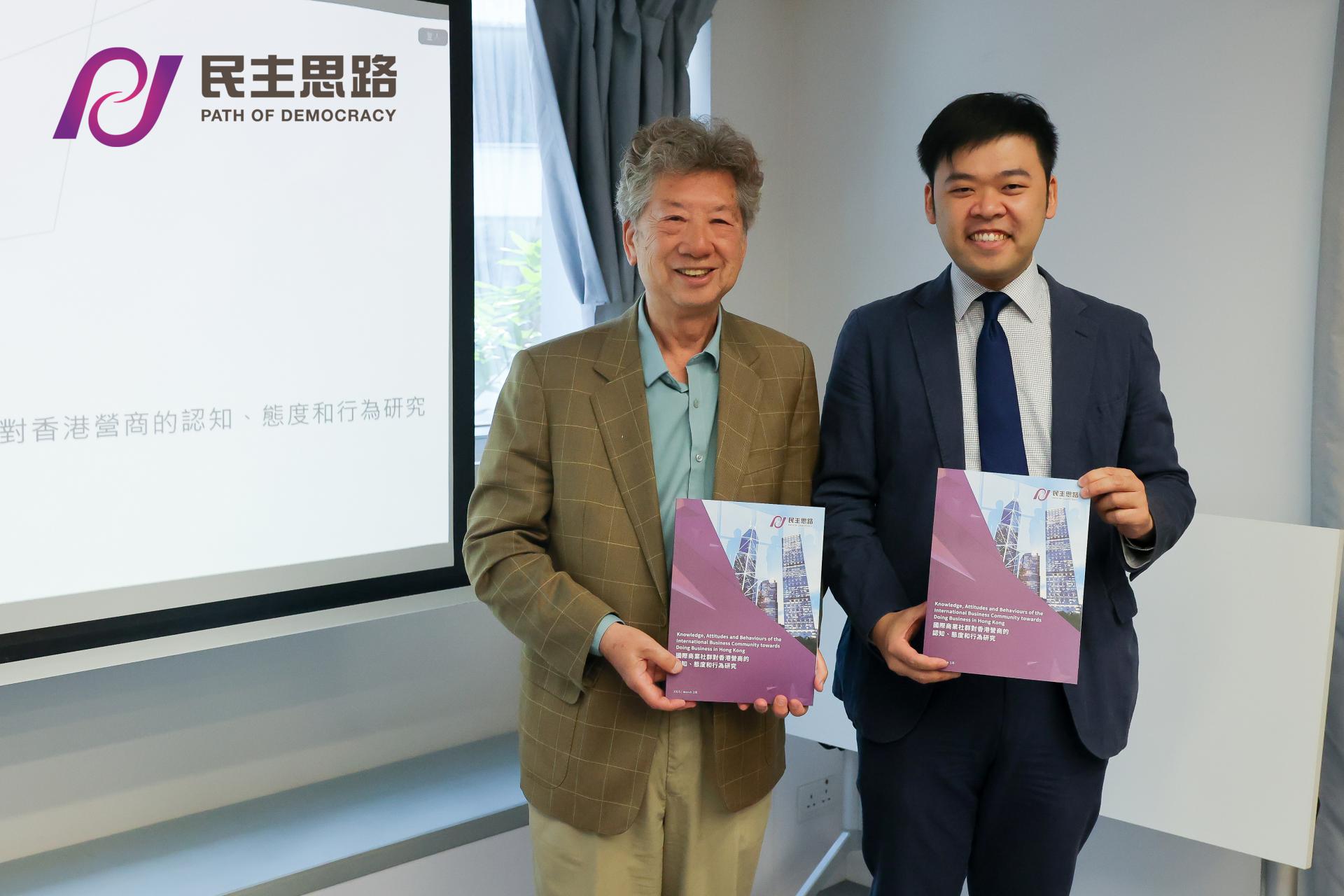Foreign Businesses Exhibit Cautious Optimism in Hong Kong While Calling for Enhanced International Image
【Press Release-Updated Version】
April 14, 2025
Foreign Businesses Exhibit Cautious Optimism in Hong Kong
While Calling for Enhanced International Image
Path of Democracy (PoD) today released a comprehensive research report examining the sentiments of the international business community regarding doing business in Hong Kong. Funded by the Hong Kong government's Policy Research Funding Scheme, the study captures the perspectives of expatriate business professionals on the current economic landscape, particularly in light of recent legal and policy changes. The report also evaluates feedback from foreign enterprises on the effectiveness of the government's economic promotional efforts and provides recommendations for enhancing Hong Kong's international business image.
Over the past year, PoD conducted an extensive review of documents and completed 12 in-depth interviews with representatives from foreign chambers of commerce across four continents. Additionally, over 600 expatriates in Hong Kong participated in street surveys conducted from September 19 to October 7, 2024, in prominent expatriate areas. A stratified sampling method ensured representation from various nationalities, including individuals from Western countries, Southeast Asia, South Asia, East Asia, and other regions of Asia and other nations.
Hong Kong's Economy Shows Resilience: 70% of Foreign Residents Optimistic About Business
Despite significant challenges over the past five years, the findings indicate that Hong Kong's economic fundamentals remain robust. Respondents demonstrated moderate confidence in the business landscape for the next five years, with 70.46% rating their sentiment as "half-and-half" or higher. Representatives from the chambers of commerce echoed this optimism, while noting the increasing competition from emerging markets such as Dubai and Riyadh.
The research assessed business behaviors in Hong Kong, revealing key trends in adaptability. While 40.36% of respondents reported downsizing or job cuts, strategic shifts included relocating key personnel or functions (22.90%), enhancing confidentiality in communication and data processing (10.87%), relocating offices or regional headquarters (9.56%), and moving capital from Hong Kong (6.59%). Encouragingly, nearly 40% reported that none of these changes applied to their companies, reflecting a degree of stability among many businesses. The survey also indicated that these business behaviors are influenced by broader factors, including the protracted effects of the COVID-19 pandemic and global economic conditions, rather than solely and simply by national security laws. Notably, 87.76% of respondents cited economic issues as the primary reason for downsizing or job cuts.
Ronny Tong, Convenor of PoD, stated, "While the administration's efforts to attract large or strategic enterprises are commendable, we must not overlook the potential of smaller economic entities. Our interviews revealed that these businesses face obstacles due to their limited size and resources, often resulting in their marginalization in policy discussions. As an international business center, we should celebrate the diversity of our economic landscape and support the growth of promising small and medium-sized enterprises."
Polarized Views on the National Security Laws: Divergent Reactions from Business and Individuals
Survey responses regarding national security laws revealed a predominantly negative sentiment, with 46.03% of participants expressing concerns about their impact on the international business community. Many respondents reported changes in personal behavior since the laws' enactment, including a reluctance to discuss current affairs (39.97%), reduced activity on social media (30.48%), and lower participation in civil society events (15.98%). However, nearly one-third (30.15%) reported no behavioral changes, highlighting a divide in personal responses.
These sentiments appeared to diverge from those of businesses and representatives of foreign chambers, many of whom indicated minimal impact on their operations, with some noting that similar laws in their home countries are more stringent and longstanding.
When asked about their primary sources of information regarding national security laws, respondents highlighted social media (61.68%), conversations with family and friends (60.20%), and international media (40.13%). Ray Poon, Co-convenor (Research) of PoD, commented, "Our findings indicate that expatriates' primary sources of information on national security legislation are largely informal. These narratives can be shaped by perceptions of Hong Kong, some of which may be negative or misleading, impacting expatriates' views on the laws."
Cognitive Gap Between Foreign Residents and Overseas: Need for Spokespersons for Communication
The research underscores a disconnect between expatriates in Hong Kong and their networks abroad regarding perceptions of the city. The survey explored views on critical issues such as safety, freedom of speech, political opposition, and rule of law, revealing that expatriates generally hold more positive views compared to what they believe their peers hold. Notably, while 91.94% agree that "Hong Kong is a safe place," only 81.05% believe their peers in their home countries would share that sentiment.
Interview respondents acknowledged that media portrayals of Hong Kong, especially by Western and international outlets, have tended to be negative in recent years. Many chamber representatives expressed a strong sense of responsibility to counter these perceptions, leveraging their deeper understanding of local conditions.
Concerns have been raised about the government's communication strategy, with critics suggesting it focuses too heavily on positive narratives at the expense of genuine emotional engagement. In this context, Ronny Tong, advocates for a more balanced approach: "Authorities should acknowledge negative news alongside positive updates, adopt a more approachable tone—sometimes humor can effectively ease tensions—and prioritize the well-being of those living in Hong Kong. Establishing new channels for addressing inquiries about Hong Kong from abroad and engaging relatable spokespersons for regular updates can enhance understanding and trust."
In conclusion, PoD extends its gratitude to the Chief Executive’s Policy Unit for their support and looks forward to working collaboratively with industry stakeholders to foster a brighter future for Hong Kong.
Navigating Tariff Turmoil: Hong Kong's Strategic Response for Resilience Through Data
In light of the recent tariffs imposed by the United States, PoD has issued a comprehensive study. Ronny Tong emphasized that, despite the challenges presented by the U.S. imposing a 145% tariff on goods from mainland China and Hong Kong, the report indicates that the actual impact on Hong Kong is limited, and citizens should avoid excessive concern.
The research reveals that local exports from Hong Kong to the United States account for only HKD 46.8 billion, representing approximately 1.03% of the city’s total export figures. In terms of imports, the value stands at HKD 217.6 billion, which remains unaffected at this time. The sanctions from the U.S. impact only a segment of Hong Kong’s foreign trade and do not compromise the city’s role as a free port or its overall economic stability.
Notably, the U.S. has repeatedly delayed or revised tariff implementation details, causing uncertainty for exporters. For instance, a recent exemption order for telephones and computers was later clarified to cover only a limited number of precision instruments, leading trade partners to perceive U.S. policy as inconsistent.
However, the impact on local exports—such as apparel, toys, and electronic components—remains limited. Affected businesses can mitigate risks by redirecting supplies to alternative markets like Japan, South Korea, and ASEAN countries.
The report also highlights that in 2023, Hong Kong's investments in ASEAN reached USD 15 billion, reflecting robust demand from both China and ASEAN. As the world’s busiest air cargo hub, Hong Kong possesses the capability to swiftly adapt its export channels.
PoD’s research asserts that Hong Kong's economy is predominantly service-oriented, with services contributing over 90% to GDP. Consequently, exports to the U.S. are not critical to the city's economic lifeline. For Hong Kong businesses operating in mainland China, while they face pressures, governmental support mechanisms, such as transformation subsidies and export redirection, can alleviate these challenges.
In response to the current situation, PoD puts forward the following recommendations:
1. Given the discrepancies in trade data between the U.S. and Hong Kong, the government should proactively clarify the differences in bilateral statistical methods to prevent misinterpretation of data that may lead to market panic. It is also essential to coordinate data standards with international partners to enhance the credibility of trade negotiations.
2. In light of the impacts of the tariff policy, the government should provide targeted support for local exporting enterprises, assisting them in adapting to the new landscape while strengthening the free port functions to attract import and re-export business from non-U.S. markets.
3. The government should help companies diversify their market reach by offering support in logistics, financing, and marketing strategies, ensuring that local exports maintain their competitiveness in the international market.
4. Close attention must be paid to U.S. policy developments, with collaboration from the industry to expedite market diversification efforts, stabilizing export performance. Additionally, it is crucial to encourage the public to adopt a rational perspective toward short-term fluctuations to avoid overreactions.
5. Targeted support should be extended to Hong Kong businesses operating in mainland China, including transformation subsidies and assistance in exploring new markets. Moreover, improving communication between the government and the public will help stabilize social confidence and encourage resilience in responding to external uncertainties.
In conclusion, Hong Kong must unite with agility and resolve to transform this crisis into an opportunity for global realignment.

Photo: Path of Democracy – Press Conference on ‘Knowledge, Attitudes and Behaviours of the International Business Community towards Doing Business in Hong Kong’ --
(from the left) Ronny Tong (Covenor of PoD) and Ray Poon (Co-convenor of PoD – Research)


 EN
EN Login
Login Donation
Donation

 Back
Back